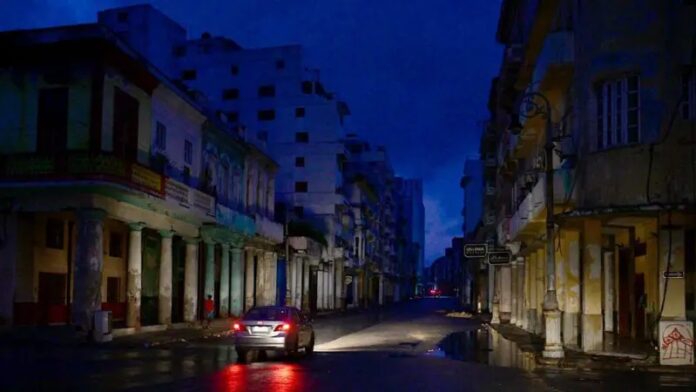
By Francisco Acevedo
HAVANA TIMES – The daily blackouts lasting between 12 to 15 hours, which had been commonplace for several months, have worsened recently. The peak that occurred with the total collapse of the electrical system this past weekend further intensified the crisis in Cuba, compounded by the passage of Hurricane Oscar and its disastrous consequences in eastern Cuba.
During the past seven days, millions of people have lived without electricity for up to 20 hours daily. In Havana, the blackout schedule has returned, but in the rest of the country, having electricity is for short periods.
Food is rotting due to heat and humidity, and the poor conditions in hospitals and public transport, for example, are also driving up crime rates beyond what they were.
Coincidentally, I was at a police station during the total blackout, and cases of theft and robbery continued to come in amid the darkness, which did not exist in the station because it evidently has a backup generator.
If obtaining food is already a problem in this country, losing the little one has after three days without refrigeration is an added blow, not to mention that very costly appliances are also affected. The inability to sustain sales of basic food rations, already severely diminished, has become evident in recent years, especially after the Covid-19 pandemic, and every month is a struggle to complete “the shopping”.
The crisis of electricity and lack of fuel is always attributed to the US embargo (which they call a blockade), but the expenses incurred in many sectors are not compared to the investments that could have been made in building reliable power plants, instead of these outdated ones that constantly need repairs.
According to unofficial data, the $2.2 billion invested in hotels could have been used to build up to 12 modern energy plants.
The same weekend as the electrical disaster, Hurricane Oscar passed through eastern Cuba, leaving seven dead —a figure not seen in decades, despite these phenomena hitting the island almost every year, sometimes even more than once a year.
This hurricane was only a category 1, yet it caused more damage than others that were much more powerful in recent decades due to the disorganization of those responsible for dealing with it.
What used to be a well-organized Civil Defense system run by the Cuban army has now collapsed due to a lack of communication, resources, and poor planning.
In the National Television News, only the authorities’ concern is mentioned along with the touted slogan that the people are not alone. However, the reality is that they were left at the mercy of God amid the weather phenomenon, which produced strong currents of water that flooded dozens of homes in the region.
Videos of citizens perched on their roofs with much of their belongings underwater have gone viral in recent days.
Although this year the traditional Meteoro civil defense exercise was suspended due to the lack of fuel —where the entire emergency system is tested— having done it for so many consecutive years should have established an automatic mechanism among those responsible for addressing the problem.
Everything failed in that alarming emergency, and for the first time in a long time, we had to mourn the loss of human lives, including minors, due to the heavy flooding that accompanied the hurricane’s passage.
There was no traditional mobilization or evacuation of citizens in vulnerable areas, and the only justification they offer is the widespread blackout that coincided with the natural disaster, as if there were no other means of communication available.
Our dear Miguel Diaz-Canel later appeared at the scene. Right in front of him, a man responsible for 29 children at a school told him that they had been left abandoned during critical hours, during which he no longer knew how to keep the children safe.
“We will investigate,” was the terse response of the president, which does not satisfy those who lost family members, and heads will surely roll, but only at the provincial level; nothing will happen beyond that.
The only good thing about all this is that the unfortunate situation served to remind the world that Cuba exists; it just needs to be understood that it is bound hand and foot.
During my stay of no more than an hour at the police station, I also witnessed the hustle and constant calls related to protests from the population, which were quelled on the spot. Later, we will learn the legal consequences of those arrests.
Believe it or not, I heard protests against repressing the population within the police force itself. “How am I going to go beat someone who is protesting for a reason?” one officer said. It seems that human logic surpasses any doctrine.
More than the power outages, it is these kinds of attitudes that make one think that the end of the dictatorship is near, because when the time comes for the truth, conscious citizens will be unable to attack their unarmed compatriots, even though this has not yet happened. Drop by drop, the consciousness of the enforcers is rising because the regime is drowning in its own incompetence.
When it is understood that dignity is not defending a doctrine that goes against freedom, then the definitive change will begin.
Read more from Cuba here on Havana Times.




